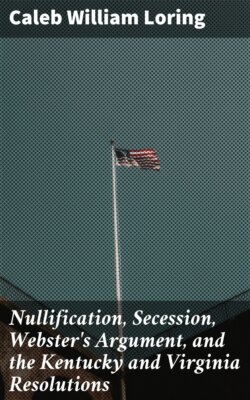Nullification, Secession, Webster's Argument, and the Kentucky and Virginia Resolutions

Реклама. ООО «ЛитРес», ИНН: 7719571260.
Оглавление
Caleb William Loring. Nullification, Secession, Webster's Argument, and the Kentucky and Virginia Resolutions
Nullification, Secession, Webster's Argument, and the Kentucky and Virginia Resolutions
Table of Contents
PREFACE
NULLIFICATION, SECESSION, WEBSTER
CHAPTER I
CHAPTER II
CHAPTER III
CHAPTER IV
CHAPTER V
CHAPTER VI
INDEX
Footnote
Отрывок из книги
Caleb William Loring
Considered in Reference to the Constitution and Historically
.....
Hayne, his antagonist, was an able, eloquent, and accomplished orator. His speech did not create that enthusiasm at the South that Webster’s did at the North; but his own State pertinaciously adhered to its doctrine of nullification and saw no defeat to its champion.
There were no less than three speeches of Hayne’s—one of them, the second, running through two days—and the same number of replies by Webster. The debate took place in the Senate in January, 1830; it arose on an amended resolution originally offered by Mr. Foote as to the expediency of limiting or hastening the sales of the public lands. South Carolina was then threatening to declare the existing tariff null and void, and to pass laws preventing the United States from collecting duties in its ports. Hayne urged that the government should dispose of the public lands and after paying the national debt with the proceeds should get rid of the remainder, so that there should not be a shilling of permanent revenue; he looked with alarm on the consolidation of the government. To get the support of the West against the East, he accused the East of a narrow policy towards the West as to the public lands and the tariff, “the accursed tariff,” as he termed it, which kept multitudes of laborers in the East to the detriment of the West. In his second speech, Hayne not only attacked the East and its policy as to the public lands and support of the tariff, but went further and “carried the war into Africa,” as he styled it, reading speeches, pamphlets, and sermons, showing, as he claimed, the disloyalty of New England in the war of 1812.
.....